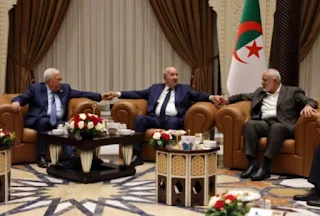
Iran's President, Raisi: Iran's positions on the nuclear deal are right, and we will not retreat from them
Raisi said, in his speech on Wednesday, "We recommend the Americans to adopt a realistic view, and to draw lessons from the past, instead of repeating the failed experiment of the policy of maximum pressure on the Iranian people."
The Iranian president added, during a cabinet meeting, that "those who violated the nuclear agreement should be vigilant and not think of repeating previous wrong experiences," noting that "the Islamic Republic of Iran did not present any demands outside the framework of the nuclear agreement, and practiced a rational approach in the negotiations."
Raisi reiterated that Iran's positions are "right and logical, and we will not retreat from them, and no party has the right to address us with the language of force," adding: "We recommend Washington to take a realistic view instead of repeating the failed experiment of the policy of maximum pressure," which it knew mainly during the rule of former President Donald Trump.
Raisi continued, "The Americans say that Iran must return to the nuclear agreement, while they are the ones who withdrew from it and violated their obligations, not us," referring to the "unjust US embargo imposed on the Iranian people."
"The United States has repeatedly declared that the pressure it is imposing on the Iranian people is unprecedented, but the Iranian Foreign Ministry has officially confirmed that these pressures have failed shamefully," he said.
Raisi noted, "The Americans must have realized over the past 43 years that they cannot speak to the Iranian people with the language of force, but they continue this approach, which will certainly not bring them any results."
Referring to the visit of the US President and other officials to the region, Raisi stressed that "if these visits aim to strengthen the position of the Zionist entity and normalize its relations with some countries, then Washington must know that its efforts in the region will not achieve security for the Zionist entity."
Addressing the US administration, Raisi said: "If you want to know the impact of your movements in the region, then look at the attitude of its peoples toward the Zionist entity, for the hatred against the Zionists and their crimes has increased in the hearts of the peoples of the region."
Raisi stressed that Iran "is closely monitoring developments in the region, and we will not lose sight of any movement in it," saying, "We have repeatedly told the Americans that we will respond firmly to the slightest move that affects Iran's territorial integrity."
Tehran denies selling drones to Moscow
In related news, on Wednesday, Iranian Foreign Minister Hossein Amir Abdollahian affirmed that his country "rejects America's allegations regarding Iran's sale of hundreds of drones to Russia."
In an interview with the Italian newspaper "La Repubblica", Amir Abdollahian added: "We have various types of cooperation with Russia, including defense cooperation, but we do not provide support to both conflicting parties, because we affirm the necessity of stopping the war, and we are working on that."The Iranian foreign minister stressed that "Tehran is making efforts to stop the Ukrainian war," noting that "the problem lies elsewhere, as some Western countries, especially America, manufacture weapons and are trying to sell them."
Yesterday, Tuesday, Iranian Foreign Ministry spokesman, Nasser Kanaani, said that "the record of cooperation between Iran and the Russian Federation, in the field of modern technologies, dates back to the period before the Ukrainian war," noting that "no remarkable development occurred in this regard, during Recently".
"These allegations by US officials came at a time when America and Europe turned the occupying and aggressor countries, including in West Asia, into stockpiles of deadly weapons," the Iranian Foreign Ministry spokesman said.
Russia: The Iranian rallies deal with Russia is misleading the American media
In turn, the Russian Foreign Ministry commented on the matter, stressing that "the Iranian rallies deal to Russia is a US media misinformation that accompanies President Joe Biden's tour in the Middle East."
"This kind of disinformation by Washington has become commonplace," a State Department source said. "It's yet another baffling and ridiculous statement by a high-ranking American representative, but we're leaving it to Jake Sullivan (National Security Adviser)."
According to the source, "this statement was apparently timed to coincide with Biden's Middle East tour scheduled for July 13-16."
He noted that this disinformation "is aimed at further heating up anti-Iranian sentiment in Arab countries, through the deliberate dissemination of misinformation about cooperation between the Russian Federation and the Islamic Republic of Iran in the sensitive military-technical field."
The source added, "Although the official representative of the Iranian Ministry of Foreign Affairs, Nasser Kanaani, actually refuted this misinformation, it must be noted that the media event itself was chosen in vain, and that Jake Sullivan's logic is not convincing, and completely devoid of logic."
Moreover, the transfer of a large number of highly efficient Iranian-made drones to the Ukrainian theater of operations far from the Middle East, would significantly reduce the risks of their use directly in the region, and could not raise the concerns of the Arab countries.
And the US National Security Adviser, Jake Sullivan, had said, earlier, that his country had information that “Iran is preparing to supply Russia with hundreds of drones,” and “train Russian soldiers to use them in the Ukrainian war,” claiming that “Iran will begin this in current month".


























































